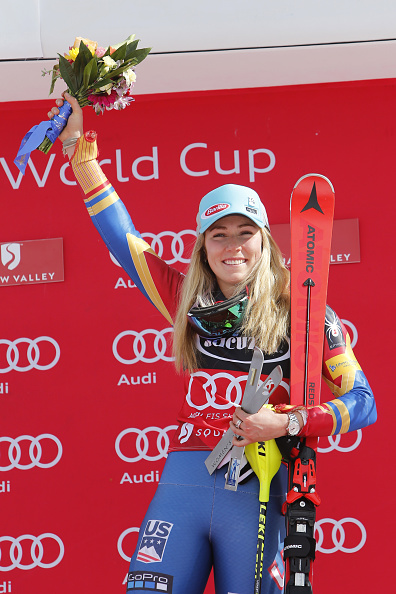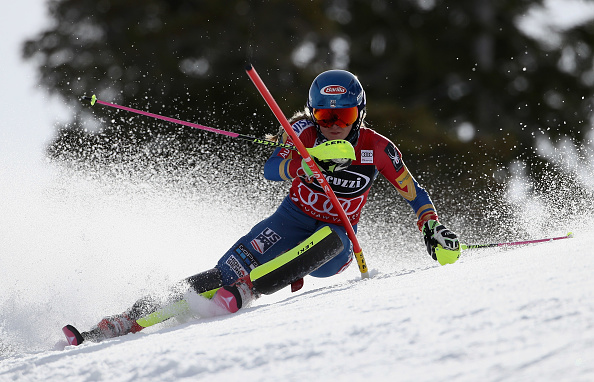The American racer Mikaela Shiffrin on Friday clinched enough points to win the fancy crystal globe that goes to the alpine World Cup tour’s best overall female skier.
She becomes just the third American to win the season title. Tamara McKinney won it in 1983. Lindsey Vonn has won four big globes, as they like to call it on the tour, most recently in 2012. Now comes Mikaela Shiffrin, who just this past Monday turned 22.
Taylor Swift could not have put it any better. Everything will be so all right.
This is the stuff of compelling cross-over stardom.
Mikaela Shiffrin is already an Olympic champion, the heavy favorite to win again at the 2018 Winter Olympics in South Korea in not just one but perhaps three events — slalom, giant slalom and combined — and already so much more, the rare athlete who not only has a calm and a presence about her but, at 22, understands who she is, what she is doing and why.
It’s elemental.
Mikaela Shiffrin is who she is because she loves it, and passionately.
She loves every bit of it. She can take that passion and distill it into a killer work ethic and uncompromising want-to.
That, ladies and gentlemen, is how you forge the sort of great champion who, come Winter Games-time, makes for must-see TV.
Unlike the schedule at most Winter Olympics, at Sochi in 2014, for instance, when the so-called technical events ran near the back end of the 17 days, in Pyeongchang next February, guess what goes off on Day 2? Women’s giant slalom. Day 4? Women’s slalom.
Why? This missive from the Department of the Obvious: Mikaela Shiffrin.
Here is the thing that separates someone like Shiffrin from the rest of almost everyone else on skis.
For her, the racing is the fun part. For real. In the start gate, the mission is not just to see if she can be good but to see how good she can be.
Nervous? Like, why?
Why be nervous, why have a thought bubble full of anxious reminders cluttering your mind, when you have done everything you can possibly do to put yourself in the best position you can be?
For Mikaela Shiffrin, there are no shortcuts. She loves the training, the hours upon hours in the gym, the repetitions in the weight room and on the icy snow, the attention to detail, all the stuff that doesn’t get reflected in the photo snaps, what our 24/7 what-now culture demands, the pics that flash across the globe in milliseconds of a winning smile and a fancy crystal globe.
“I am always at my best,” she said, calmly, evenly, “when I get good preparation and I feel strong.”
That simple, that elemental, and Mikaela Shiffrin’s 2017 overall win marks an intriguing moment if, like most Americans, you are just checking in on what’s what in alpine skiing.
Alpine racing is, generally speaking, divided into two kinds — the technical events and the speed races.
When most casual fans think alpine, they think speed, something like Robert Redford in “Downhill Racer,” which goes all the way back to 1969. (Warren Miller's love sonnets on film to the sport do not count for the casual fan.)
Making this easy:
The speed events are the downhill and the super-G.
Downhill: spitballing it here, you see how fast you can get down the mountain. There are gates, but whatever— the main thing is the speed, like 80 miles per hour, which is a lot on a freeway in a car made significantly of metal and other durable parts, much less on skis chattering down a river of ice. A world-class course runs to two minutes. Try to imagine it: ice (it's ice, not fluffy snow), 80 mph, two minutes, skis, yikes.
Super-G, same general idea but some widely set gates and the course is set lower down the mountain, meaning it's shorter.
The tech events, on the other hand, are the twisty, turning ones, the ones with all the gates close together.
Making this easy, again:
Per someone clever, those tech events, the giant slalom and slalom, will be coming to your living room early in the 2018 Olympic run.
A fifth alpine event, the combined, is just what it sounds like, one speed event and one tech, say a super-G and a slalom. You add the times of those two races together, lowest total wins.
On the men’s side, an Austrian racer, Marcel Hirscher, has won the World Cup overall title six seasons running — 2012 through 2017.
Hirscher is a tech specialist, the king of slalom and in the 2015 and 2017 seasons, giant slalom, too.
Compare that to the American standout Bode Miller, a five-event skier who won the overall title in 2005 and 2008.
Shiffrin is a tech specialist, too. She is the Sochi 2014 slalom gold medalist. She is the World Cup slalom winner for the 2013, 2014, 2015 and 2017 seasons. (She spent two months away from racing during the 2016 season after a fall.)
Compare that to Vonn, the German Maria Höfl-Riesch (2011 overall winner), the Slovenian Tina Maze (Sochi 2014 downhill and giant slalom champ, showing her versatility, and 2013 World Cup overall winner with an otherworldly 2,414 points, breaking the legendary Austrian hammer Hermann Maier’s record of 2,000, set in 2000).
All three of these women: four- or five-event racers.
Would Shiffrin this season have been competing in more speed events if the Swiss racer Lara Gut, the 2016 overall champ, had not, in a Feb. 10 warm-up at the world championships, torn an ACL?
If, similarly, the Austrian Anna Veith was not coming back from injury? Before she got married, she was Anna Fenninger — the name by which she won Olympic gold in 2014 in the super-G and, moreover, won the big globe in 2015 and 2014.
Heading into the weekend’s racing in Aspen, Shiffrin stood at 1,523 points. No matter what happens, she can’t come within a canyon of Maze’s 2,414. Does that matter, even a little? Gut had 1,522 in winning last season. Shiffrin already is better. Again, does that matter, even remotely?
Questions without answers and, anyway, it’s not as if Shiffrin can’t ski speed.
Shiffrin did, after all, win a combined this season, in late February, in Crans-Montana, Switzerland, and it’s for sure the case that as she goes and grows, all involved expect Shiffrin will do more speed.
A comparison: when Michael Phelps was a much younger swimmer, his coach, Bob Bowman, would allow him only to swim distance. As he grew into his ability, Bowman saw to it that Phelps broadened his repertoire.
Same general idea with Shiffrin.
The thing is, she and her team have a plan, and what Shiffrin and her team do, and exceedingly well, is develop and execute that plan.
As Julia Mancuso, the American skier who is herself a four-time Olympic medalist, including a gold from the Torino 2006 Games, said, “If it isn’t broke, why fix it? That’s their mindset.”
Mancuso added, “It takes a lot of strength to not deviate from that plan as well.”
Ski racing is full of numbers — so many it can become numbing — but just consider a handful.
Before this weekend’s races, Shiffrin had stood in the start gate 103 times. She had produced 31 wins and 43 podiums.
As Patrick Riml, the U.S. Ski Team’s alpine director, put it, “Her strike rate is unbelievable.”
It is often said that hitting a major-league curve ball is the hardest thing to do in sports. Those who say that have never stood in the start gate of a World Cup course and looked at the gates and the ice. Shiffrin’s win rate would make her, in baseball terms, an All-Star, a .300 hitter. Her podium rate puts her in Rogers Hornsby or Ted Williams category.
Long-range: Vonn has 77 World Cup victories. Sweden’s Ingemar Stenmark has the most, 86.
“Kudos to [parents] Jeff and Eileen for teaching Mikaela what it takes,” Riml said.
“Look,” he said, “everyone who skis the World Cup has talent. Otherwise, you wouldn’t be there.
“Who wants it? Who wants it bad enough? Who wants it bad enough on race day?
“You can see it,” he said, “from the start gate,” and indeed you can.
Mikaela Shiffrin wants it. And she is feeling every bit of 22.











